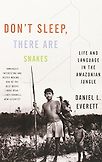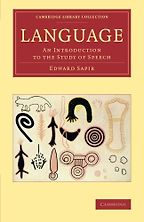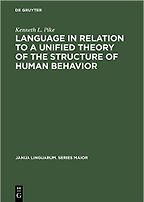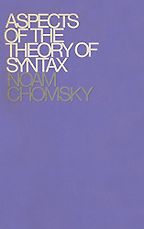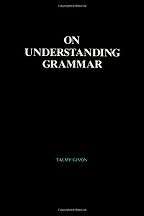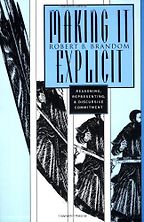How did you get interested in studying language and its relation to thought?
I got interested in language first of all because I wanted to be a Bible translator and I really didn’t know what that entailed. I had never heard of linguistics and then it turned out that, in order to be a translator, I had to take more or less the equivalent of a master’s degree in linguistics. So then I went to Brazil as a missionary and they asked me, because I had done well on these linguistic courses, if I would be willing to take the assignment of this language called Pirahã that no one had been able to figure out and I said yes. I went there in 1977 and, through the course of the next several years, found out that I was more interested in linguistics than I was in Bible translation. So, I finished my PhD in linguistics and have worked as a professional academic linguist ever since.
The way you describe it makes it sound very straightforward but I’ve read your book, Don’t Sleep There Are Snakes, and being chased by an anaconda can’t be a straightforward thing!
There was a lot of adventure and there was tremendous trauma in coming to the realisation that I was no longer a believer and what would that mean to my family, and my income. I was commissioned as a missionary and generally they don’t want to support people that don’t believe in God. At the same time, I was living for about eight years with the Pirahã people, hunting in the jungle, fishing, helping people make fields. I had many encounters with snakes and spiders and anacondas and jaguars and all sorts of things.
But the upshot of all of that was that I was fascinated with how this people had constructed a way of life over time and spoke a language unrelated to any other known human language that was alive — is alive. For a number of years I was able to just do my linguistics because it was considered part of Bible translation and I even started and translated the Gospel of Mark. But I realised that the relationship of trust I had built up with the people didn’t allow me to knowingly tell them things I didn’t believe as though I did believe them. I had this crisis of conscience and eventually left the mission. I’m very happy that I have had the experience in the Amazon that has affected my thought about the relationship between language and culture and the mind so profoundly.
Not least, presumably, because the Pirahã had such an unusual language. As I understand it, they don’t have numbers do they?
No, they don’t have any numbers. All the claims that I’ve made about the Pirahã have been subsequently tested. So, I made the claim they don’t have numbers and they don’t even have the number one; that’s now been tested by three separate teams in publications in Cognition, Cognitive Science, and Science. I claimed that their language didn’t have recursion — that’s been very controversial.
Recursion is this crucial proponent of grammar proposed by Chomsky as what distinguishes the human communication system from all other communication systems. But we actually have a new paper — several MIT brain and cognitive sciences faculty and students and me — in which they’ve spent the last three years rigorously going through the data testing my claims and are prepared now to come out and, in effect, say that I seem to be correct.
They agree with me that the language of the Pirahã not only lacks recursion but is what was considered to be an impossible human language: a finite language. Chomsky made his claim long before talk of recursion in saying that human languages were not finite. So, here we have an example of what looks to be a finite human language.
They also have a very strange sense of the past tense, don’t they?
Yes, they don’t talk about the past. They don’t have past tense; they don’t have any tenses. But, that doesn’t mean they can’t think yesterday I was doing this and tomorrow I’ll be doing this, it’s just they don’t talk about those things. There are certain things we don’t talk about in mixed company or in certain situations – we all have social constraints – but there’s a general cultural constraint in Pirahã that you don’t talk about the distant past or the distant future and you also don’t generalise more than is necessary.
Get the weekly Five Books newsletter
That ‘more than is necessary’ is what has led us to look at how evolution requires that we have a distinction between generics and specifics. For example, I have to be able to talk about snakes as an entity and the snake as a specific entity, but I don’t have to talk about all snakes – so there’s no way to talk about all snakes in Pirahã. Some philosophers have long argued about whether generics and universal quantification – like ‘all’ – are the same thing or not, Pirahã suggests that they’re not and there are different evolutionary functional reasons why we distinguish them.
So that gets right into our first book in a way because Sapir was famous for the Sapir–Whorf hypothesis about the relationship between language and thought.
Yes. Sapir’s 1921 book Language is still to me the most important pioneering book ever written on linguistics and I’m probably unique in holding that perspective. Everybody knows it’s important but I just think it’s massively important. In it Sapir talks about bi-directional influences between culture and language and thought. A lot of people only give him credit for the idea that the language we speak can affect the way we think, which then became known as the Sapir–Whorf hypothesis. Whorf actually learnt this from Sapir.
But Sapir didn’t stop with that, he said that just as language can influence thought, culture can influence language. He argued that language clearly has some computational aspects that cannot be reduced to culture but there are a number of broad characteristics we find in individual languages that reflect the culture that they emerge from. I find that to be extremely pioneering – extremely prescient – and just incredibly innovative.
I can’t think of anyone in the history of the study of language that has been more innovative in thought about language than Edward Sapir. He died in 1939 at the age of fifty-four, right at the beginning of World War Two. I think that’s one reason he had less influence. He hadn’t been at Yale that long and was replaced shortly thereafter by his arch rival in the field: Leonard Bloomfield. Bloomfield took his position at Yale, got a number of students, and had much more influence in the next decade or so, especially after the war when people were coming back and Sapir was a distant memory and Bloomfield was the active scholar, the leader of American linguistics.
A lot of people, myself included, have this kind of caricature of Sapir’s approach to language as if you don’t have the word for it you can’t think about it. Is that wrong? That’s not the Sapir-Whorf hypothesis at all?
That is one possible interpretation. You can take the Sapir-Whorf hypothesis and it has two manifestations: one is linguistic determinism and one is linguistic relativity. Linguistic determinism is the idea that the language we speak determines the way we can think. Linguistic relativity is a much weaker hypothesis and suggests that the language we speak affects in some way some of the ways we think when we need to think quickly. And this is confirmed in experiments.
Actually, my son has a new book out on linguistic relativity and he shows in a number of experiments that people have to make decisions and think very quickly online and that their language shows greater effects on the way people think than if you give them more time to think about the problem. This suggests that language is a tool for thought but it isn’t thought.
Five Books interviews are expensive to produce. If you're enjoying this interview, please support us by donating a small amount.
So we definitely think without language and I think that has to be true because otherwise we have no explanation of animals. The more we equate thinking with language, the less able we are to cater for the thought that my dog clearly has when she comes to me to go for a walk or understands the dozen or so words that I speak to her that I know she understands.
Also, pre-linguistic children presumably have thoughts?
Yes. So you have other species that clearly have thoughts; they have beliefs, they have intentions, and you have pre-linguistic children that clearly have thoughts and intentions. Language is a great facilitator of thought but it also affects it. The Sapir-Whorf hypothesis has been caricatured for so long so that the philosopher Donald Davidson wrote an important article called ‘On the very idea of a conceptual scheme‘ in which he argued that it really doesn’t make any sense to say that there are people who think so differently than us that they can’t understand us because, if that were the case, we wouldn’t know if they were thinking or speaking because we’d have no basis of comparison.
I don’t think it’s genetic; I think that if we found Martians we could possibly find a way to communicate with them which would clearly mean that it’s not a genetic thing. Yet, at the same time, Sapir really is caricatured and I think that has affected the importance that he should have in the field and has diminished it.
Let’s go on to the second book. This is by Pike; it’s Language in Relation to a Unified Theory of the Structure of Human Behaviour – bit of a mouthful as a title!
The book is incredibly large and the most common use to which I’ve seen it put is as a doorstop and paperweight. Kenneth Pike was my first professor in linguistics and he taught me how to do the monolingual field demonstrations that I do in different places.
I’m not saying it’s the best written book. I don’t like it because every word is a jewel and couldn’t possibly be removed—it could be removed by thirty percent and would pretty much say the same thing.
But what Pike does is offer an integrated theory—I prefer to think of it as suggestive ideas rather than a theory—about how our understanding of language could serve as a basis for the understanding of culture. So, language is designed or language has features – Pike was a theist so he did believe language was designed and many parts of language in his theory have triune effects, I think that the trinity affects his thought in there.
If you take “John sees Bill”: John is the subject as an actor so he has a slot; he has a semantic role: actor; the slot has subject, and he has a category: he’s a noun-phrase. “Sees” is the same thing: it’s a verb-phrase as a predicate in the predicate position, and then you have the object which is also a noun-phrase which is an undergoer. This is his basic theory of language – these are fundamental components – but he says let’s look at culture and see that if I’m an interviewee, I’m playing a certain role. I have other roles that I play and I have a certain category that I belong to, however we choose to do this. Pike said that this idea that language has slots and fillers that can then be arranged in a matrix and looked at statically or dynamically works for culture too.
I don’t think he worked it out really well. In fact that’s largely the basis of my new book. I use Pike’s theory – the key idea that Pike had was emicization. I’ll give you the etymology: phonetics is the study of physical properties of sounds; phonemics is the study of the sounds that are meaningful to the speakers. Pike took the ends off those words – etic and emic – and this has become incredibly influential in anthropology though much less so in linguistics, ironically. The basic idea is ‘etic’ is the perspective of the outsider: I go and I can say ok, here are the sounds that I hear in the language – I’m a phonetician – I don’t know what these mean to the speaker until I do some analysis. Once I’ve done the analysis, I’ve got the perspective of the insider and now I’m doing phonemics. So etics is the outsider, emics is the insider, and emicization is the process of going from alien to insider.
So, participant observation in a sense?
Yes, participant observation but more than that because I become part of it; my judgements become native judgements. So think of a child – that’s the ultimate participant observer – the child is born an alien and within a period of time not only learns language but learns culture, learns values. This entire concept of culture as a process of turning people into insiders, making them part of a group, and how this works with language and culture to me is probably the most important idea of language, as Pike wrote.
You see it in Marvin Harris (the anthropologist) and in Clifford Geertz (another anthropologist) who have been somewhat influenced by Pike’s view. Anthropologists really find this idea of outsider-insider useful and they’ve tried to systematise it. Pike did systematise it in linguistics which is how it has become a popular anthropology. It’s similar to Chomsky’s view…
Which is our next choice, actually, so we might as well seamlessly segue in there.
Chomsky started his bachelor’s degree at the University of Pennsylvania with Zellig Harris who was one of the leading structural linguists of the time – still unsurpassed in many ways. Chomsky is unusual among linguists in that he had the same advisor for BA, Master’s, and PhD.
That sounds like a bad idea, pedagogically.
One could say so. There are interesting historical reasons for this, but Chomsky started with Zellig when he was nineteen and finished his PhD when he was twenty-seven or twenty-eight. In 1965, after Chomsky had already been well-established, he published two completely different landmark books. American Power and the New Mandarins is a deeply well-thought-out and insightful criticism of US foreign policy in Vietnam and Aspects of the Theory of Syntax is by any measurement an absolutely beautiful, astounding work of genius. It has made Chomsky, in most people’s minds – not in mine but in most – the most important linguist of probably all time.
If it’s not Chomsky, who is the most important linguist?
I would say Sapir.
That’s interesting. With Aspects of the Theory of Syntax, obviously a hugely influential book, what’s the essence of the book?
The essence of the book has these brilliant ideas of deep structure. Every sentence in every language starts off at one level in which the literal meaning is represented, and then gets transformed by operations at that basic phrase-structure. When a phrase like “John saw Bill” is derived for a particular purpose you might get “Bill was seen by John”, so you’ve gone from an active to a passive. In the early days, the passive was derived from the active in a sense. This deep structure idea was hugely influential – Chomsky doesn’t believe in it any more but it was hugely influential at the time. The concept of transformation looked like it worked; it looked like not only did it work but it had psychological implications. One hypothesis that emerged from this that was heavily tested in psychology was: the longer the derivation takes to get from deep structure to surface structure, the more difficult it should be for a native speaker to process the sentence.
Would that be like switching tenses or complicated hypotheticals?
If you go back to the simple active-passive pair, the passive ought to be more difficult for people to understand – “Bill was seen by John” – than the active – “John saw Bill” – because the passive requires an additional transformation that is not required by the active. A lot of the earlier results seemed to support this so it was incredibly exciting. Psychologists got involved and Chomsky laid out – prior to this book but he referenced it in this book – what is now known as the ‘Chomsky hierarchy of grammars’ showing where languages fall along a scale from finite-state to context-sensitive without countenancing the possibility that a language could be finite. Well, actually, that’s the result that we’re getting in the new paper: we have found human languages that are finite.
Just to get clear what a finite would be, this is something at the level of the deep structure is it? Something that is, as it were, a proto-language?
Well, no. What it means is that there’s an upper-bound; you can say this language does have a longest sentence. In English, there is no longest sentence. Any sentence you can think of, you can make larger by preceding it with something like “Mary said…”
A finite language is one that has very clear limits as to what can be said. You can’t keep generating new sentences ad infinitum?
That’s right. I mean, you can make new sentences but you can’t make a given sentence longer than a certain limit. That’s highly unusual, and that was exactly what Chomsky said no language can be. That was a fascinating result because nobody had ever thought of languages in these mathematical terms. Nobody had ever thought about language as a computational system and a grammar as the underlying computational system of thought. This work was incredibly rich. My view of it, in retrospect, is that in the intervening fifty years – we’re now fifty years from the publication of that book – it doesn’t seem to have panned out. One cannot criticise it for that. To me, in some ways, this book is like Freud’s first book on the unconscious. I don’t buy the ego, the id, and the superego any more, and I don’t buy the Oedipus complex, but I think that Freud was the most marvellous writer on the unconscious that ever lived. That fact that he was wrong is almost irrelevant because he got people thinking about things they never thought about before. To me, Chomsky is the same; I think he’s wrong on a lot of this stuff but nobody thought about language in this way before he came along.
The most usual way of describing the Chomskyan approach is to talk about it in terms of universal aspects of grammar which is somehow innate in all human beings that give us a propensity to learn a certain kind of structural form of language.
Yes. Interestingly enough, it didn’t come out in the earlier writings. It came out later and around the time of the publication of Aspects, Chomsky was talking about it much more – this idea that language is acquired so quickly and is so similar across the world’s languages that it must come from a common genetic core: the ‘universal grammar’. I don’t think that’s panned out either; I think there are a lot of arguments against. Still, it’s a beautiful, plausible idea and it’s a wonderful hypothesis. So like Freud’s unconscious, Chomsky’s universal grammar was an important idea in the history of thought. The fact that it’s wrong – that’s just the way things turn out sometimes.
He doesn’t think it’s all wrong now though, presumably?
No, he doesn’t at all. He defines it in different ways according to the kinds of criticism that come. I have a number of articles in which I have ongoing discussions about this stuff. Sometimes I am cast as this person that hates Chomsky because I am disagreeing with him so strongly and my answer to that is that this debate is only possible because he laid out the terms on which we can have this debate. I have learnt tremendously about Pirahã because I’ve had to think about it in Chomskyan terms. I think Sapir is more important because his ideas are less startling and headline-grabbing – although Sapir-Whorf is pretty exciting – they are basically just right. They seem to be working out really well. On the one hand, you have these great ideas that are extremely well-expressed that didn’t turn out and on the other, you have other great ideas that are well-expressed that did turn out. That’s why I choose Sapir. I actually think Pike is much greater than people give him credit for and I think he’s criticised and not given enough credit because a) he was a strong Christian and b) he didn’t write very well. Those counted against him but the people who’ve worked with him and who knew him understood that his knowledge of language was astounding and his ideas, once you get through the verbiage, are actually pretty good. That’s another reason that the book is so important to me.
Were you ever taught by Chomsky?
Yes, I spent a year as a visiting scholar at MIT and sat in on Chomsky’s classes. My office was next to his and he and I met several times during the course of the year. He wrote a letter of recommendation for my first job and he wrote a letter of recommendation for my tenure-case at the University of Pittsburgh. So, he was very supportive of me and I used to get all of his papers, in the days before the internet, when it was quite a coup to be getting Chomsky’s unpublished manuscripts for comments. Even though I lived in Brazil, I would go to the post office once in a while and there would be a big manila envelope from MIT with Chomsky’s most recent stuff in it.
Out in the Amazon?!
Yes, he would mail it to me in Brazil and I would get in at the local post office and sit and read. Very few people would have access to it and there I was in the jungle reading his newest stuff.
Let’s go on to the fourth book: Givón’s On Understanding Grammar. Again, we’re talking about syntax and grammar. Is this a technical book?
This is a fairly technical book. So, Tom Givon—also known as Talmy Givón—had training as a biologist and did his Master’s in biology, but then he went on to do a PhD at UCLA and was hired as a faculty member at UCLA.
Chomsky’s most controversial claim is that form is distinct from meaning; the form of a grammar is independent of what it means. Givon said this doesn’t make any sense – we can never understand grammar unless we take meaning to be the core. He was following in the footsteps of several others, as all of us are, but he still came up with this original proposal that the forms of language are driven by the functions they have to perform. So, you get into this form/function controversy that exists across so many disciplines.
So it’s like the style/content argument is it? The idea that you can’t separate style from what’s being said?
Exactly. It’s more of an architecture: is the building form totally independent of the function the building has to perform? Basically, these ideas come into language and Givon was the first one to write a book-length treatment that was considered to be a serious challenge to the ruling theory of the day which was Chomskyan theory. And that book, On Understanding Grammar, affected my thought and profoundly affected the thought of many others. By the way I know all of these people quite well except Sapir, and Givon is also a top old-time fiddle player and he and I have played a lot of music together.
Oh brilliant! You play the guitar don’t you?
Yes, I play the guitar. So, Givon launched an entire research programme and became, in my opinion, the most important voice in the research programme known as functional linguistics which was diametrically opposed to formal linguistics which was Chomsky’s theory. It’s not that there is no formalisation of functional linguistics, it’s just that formal linguistics means I take form to be the basis – that’s what I’m trying to explain; it’s a form of structuralism. Chomskyans, of course, get upset when I say this but they’re a continuation of structuralism. Getting back to semantics and meaning as the basis of form was what Givon was advocating.
Does that mean that every syntactical aspect of a language has meaning?
Yes. Everything has meaning in one sense or another. Givon does a pretty good job of explaining why the preposition ‘beyond’ has two syllables and the preposition ‘to’ has one syllable. He explains this in terms of their role and how frequently they’re used and how much information they have. One idea is that the more information something has the longer the word is. Obviously, you can think of exceptions in English; it has so many different words from so many different languages that you have to think about the original language and not English per se.
Well ‘floccinaucinihilipilification’ is a bit redundant in terms of the syllables for the meaning conveyed…
(Laughs) Exactly! But why do we elongate things? Actually, George Zipf argued that the things that are used more frequently are shorter than things which are used less frequently because it takes too much time and too much effort if we’re always saying prepositions like ‘to’ to have it somehow be polysyllabic. In fact, when we hear people talk, it disappears. I don’t say always in American English “I want to go”, I say “I wanna go” and this preposition has been reduced to a vowel.
So it’s a somewhat utilitarian account of language – I mean the utility of brevity.
Yes, it’s like a second law of thermodynamics view of language where entropy is a major factor to be considered. But Givon’s book was really pioneering and the reviews of it at the time – even the negative reviews – said for the first time Chomskyans have a sustained, empirical argument that they must respond to because this does provide an alternative. Even the negative reviews, and there were extremely negative reviews as there were extremely positive reviews. To me, a good book should have both. It should really piss people off and all of these books piss people off; every one of them irritated somebody. I think that’s a tremendous characteristic of a book if it’s actually saying clear new things. The stage of this is when a new idea first gets heard and you say that’s crazy or that guy’s a liar, and the next thing is well it’s really redundant, it doesn’t add anything, and the final thing is well, we all knew that anyway. These are the brief stages of the acceptance of ideas.
Let’s take the last book: Bob Brandom’s Making it Explicit.
Like Pike’s book, it’s enormous. It’s a very large, 750 page, incredibly detailed presentation of what he calls ‘inferentialist semantics’. Unlike Pike’s book, the words all seem to be necessary; it doesn’t seem that you can cut this book down much. I’ve read some of the reviews that said you could have cut it in half, but that’s like when the emperor of Austria told Mozart that his piece had too many notes and Mozart said “which ones should I take out?” I’m not comparing Brandom to Mozart but it’s a really important book. Basically, the idea is we don’t know a concept unless we know how to use it. Stop and think about the implications of that. There’s another book on concepts by Sue Carey in which she doesn’t dispute that knowing how to use a concept is important but argues it’s native and that concepts are inborn. Brandom makes it difficult to think of concepts as inborn because if you don’t have a concept unless you know how to use it, then you can’t be born knowing how to use it; you’ve got to learn how to use it, in inferences. That’s wherer the ‘inferentialist’ in ‘inferentialist semantics’ come from.
Do the inferences come from culture? There’s a pattern of inferences you’re expected to make?
He doesn’t refer to culture but it fits very nicely with my view of the fact that inferences do come from culture. You would need to know the culture to understand the concepts and to understand how to speak and how to understand these things. That’s my own extrapolation from what he said but what he does is to show that, within the linguistic context alone, you have to know how to use something. There’s no representation that shows that this means x and I just put it in a spot in a sentence. He says sentences are constructed and inferences are the crucial part of the construction. In my view, sentences are the result of dialogue and negotiation. If I ask you did your parents arrive yet? and you answer there were fish in the river, it’s not clear how those two are related but I will damn-well make an effort to figure out how that could possibly answer my question. I understand then that that obviously enters into other philosophical traditions as well. Brandom’s book lays out the importance of inferences and use and – for me – culture for understanding concepts. There’s been this long distinction in philosophy between knowing-how and knowing-that; I know how to ride a bike and I know that it is Tuesday. But if Brandom’s right, that distinction is done away with because I can’t know that unless I know how to use that word.
So ‘Tuesday’ is a word – a tool like any other word. Is that a Wittgensteinian influence?
Yes. Very heavily influenced by Wittgenstein and Wilfrid Sellars – there’s a long tradition of this. Wittgenstein’s work is so useful to my view of language as use and language in culture, and Brandom is a further articulation. The other thing that I love about Brandom’s book is that it fits in the pragmatist tradition – the American pragmatist tradition going back, according to some, to the American Indians but certainly starting with William James and Charles Sanders Peirce and John Dewey. Brandom’s thesis advisor was Richard Rorty who was another leading pragmatist. To me, today, in philosophy Brandom was probably the leading American pragmatist. It’s not the same as James’s pragmatism but is language as use and language as function. It fits very well with the tradition and I think that it probably, of all the books I’ve listed, it’s one of the most important books of the last twenty or thirty years on language. In my personal thought, it’s been one of the most influential and important books.
Get the weekly Five Books newsletter
So, here we have a picture going from the first book to the last book, beginning with somebody who looked at the importance of the connection between language and culture but at the same time took both of them seriously as separate entities that overlapped and interacted. To me it wasn’t one supervening on the other but a symbiotic relation; they help form each other. Then you move to Pike who tried to develop this model further, he was influenced by Sapir; you move to Chomsky who presented a totally different perspective and got people thinking in a different way. Givon’s book was a reaction to that. He said sure we do need form, but we need to get it back to meaning. Brandom’s was, for me, the ultimate statement of how meaning arrives in grammar – ultimate is probably too strong, but it’s one of the most important statements that has been made on that since Wittgenstein.
Five Books aims to keep its book recommendations and interviews up to date. If you are the interviewee and would like to update your choice of books (or even just what you say about them) please email us at [email protected]

